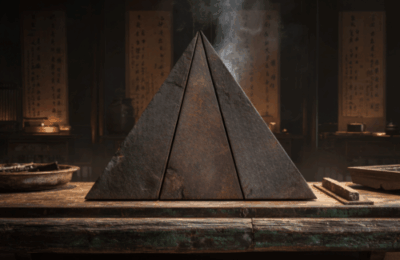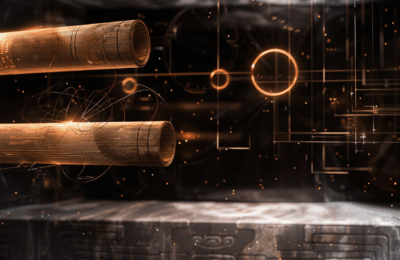在竹简与帛书的残页里,我触摸到先人的手迹与气息。
它们不是尘封的古物,而是文明记忆的纤维,在今日依然延展成新的语言与节奏。
English
Within the fragments of bamboo and silk manuscripts, I touch the traces and breath of the ancients.
They are not relics buried in dust, but living fibers of memory, still unfolding into new language and rhythm today.
Deutsch
In den Fragmenten von Bambus- und Seidenhandschriften berühre ich die Spuren und den Atem der Vorfahren.
Sie sind keine verstaubten Relikte, sondern lebendige Fasern des Gedächtnisses, die sich heute in neue Sprache und Rhythmus fortsetzen.

《楚文明导航地图》是一张由六十缕光织成的文明呼吸谱。
当竹简沉睡两千年再度被展开,我们听见的不只是制度、制度、事件,而是一座文明在黑暗中、在风中、在火中、在歌声里,缓缓调息的方式。
这张地图将六十篇楚简新读重新归于五种生命节律——元息、脉息、气息、共息、声息——宛如文明的五种呼吸。
它们不是分析框架,而是古人观看世界的方式,也是我们重新学会呼吸的入口。
从宇宙胎动的第一缕微光,到四季脉动的心跳;从人心的隐语、情绪的暗流,到千万人共享的一口气;从风中的美学,到穿越时间的歌声——
楚文明告诉我们:
文明的延续,不靠征服,而靠呼吸。
人生的安顿,不靠效率,而靠节奏。
愿这张地图成为你走回源头的一盏灯,
也成为你在喧嚣时代里,重新找到自己的——呼吸之道。
“A Navigation Map of Chu Civilization” is a breathing chart woven from sixty beams of ancient light.
When bamboo slips, asleep for two millennia, are unfolded again, what emerges is not merely history or governance, but the quiet rhythm of a civilization learning to breathe—
in darkness, in wind, in fire, in song.
This map gathers sixty essays into five life-breaths of Chu culture—
Primordial Breath, Seasonal Pulse, Human Breath, Shared Breath, Resonant Breath.
They are not analytical categories but ancient modes of perceiving the world—and an invitation for us to breathe again.
From the first tremor of the cosmos to the pulse of the seasons;
from the subtle syntax of the body to the storms of emotion;
from the shared breath of a nation to the beauty that travels through time—
Chu civilization whispers:
A civilization endures not by conquest, but by breath.
A life becomes whole not by speed, but by rhythm.
May this map be a lantern guiding you back to the source—
and a compass for rediscovering
your own way of breathing
in an age that forgets to breathe.

本篇文章循着竹简上的轻响,走进清华简《参不韦》的世界。我们不再将其视为古老训诫,而是聆听一部文明自身的“心跳记录”——从启动文明的第一行代码“五则”,到架构社会的呼吸与脉动;从身体与天地法则的精密对应,到九种让文明窒息的低语;最终,抵达那份“山渊之喻”中蕴藏的、关于平衡与持久的古老智慧。
这是一次与战国楚人的深度对话,他们留下的不是答案,而是一套让文明在时间中“持续呼吸”的系统思维。在速度至上的今天,这份竹简悄然提问:当一切都在狂奔,我们是否还记得,如何听见并守护一个文明最深沉、最根本的心跳?
This essay follows the faint rustle of bamboo slips and enters the world of the Tsinghua manuscript Can Buwei. We no longer read it as an ancient admonition, but as the “heartbeat record” of a civilization itself—beginning with the first line of code that boots a world, the Five Principles; moving through the breath and pulse of social architecture; tracing the precise correspondences between the human body and cosmic law; listening to the nine low whispers that suffocate a civilization; and finally arriving at the “Parable of Mountain and Abyss,” where an older wisdom of balance and endurance resides.
This is a deep conversation with the people of Warring States Chu. What they left us is not a set of answers, but a way of thinking—a system that allows a civilization to keep breathing across time. In an age that worships speed, these bamboo slips pose a quiet question: when everything is rushing forward, have we forgotten how to hear, and how to protect, the deepest and most essential heartbeat of a civilization?
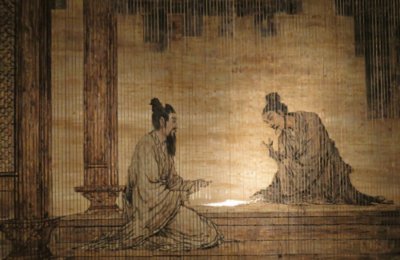
《曹沫之陈》呈现的不是战场技艺,而是一套由失败逼出的治理哲学。竹简将“三战三败”的经验转化为结构性洞察:军事溃败源自政治偏离,逆袭必须从制度与德政的重建开始。文中批评“面子工程”、强调“修政善民”、破除宿命论、以德性重构国家的核心竞争力,其思想结构与安大简等楚系文献所体现的“德—政—治”框架高度同构。本文以文献互证的方式,展示春秋时期弱国如何通过自省与治理改革重获战略主动权;并指出真正的胜负,从不是战场决定,而是政治系统决定。
Cao Mo zhi Chen is not a treatise on battlefield tactics but a work of governance extracted from repeated defeat. The text reframes military failure as a symptom of political dysfunction and positions systemic reconstruction—rather than stratagem or force—as the basis for national resurgence. Its critique of vanity projects, emphasis on internal governance, rejection of fatalism, and insistence on virtue as political capital closely parallel the “Virtue–Governance–Order” structure seen in the Anhui University Chu manuscripts. Through cross-textual analysis, this essay demonstrates how weak states in the Spring and Autumn period regained strategic agency through introspection and reform, revealing that the true determinants of victory lie not on the battlefield but within the political system itself.
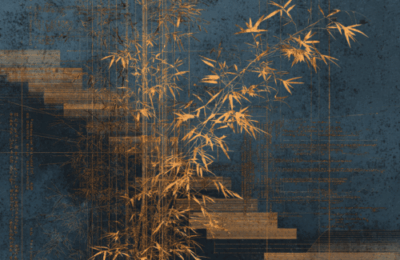
本篇文章以上博简《天子建州》《从政》为中心,对楚国政治思想中的“体用合一”治理结构进行系统性分析。《天子建州》展现了楚国王权秩序的顶层设计,可视为早期的“建国大纲”;《从政》则呈现从政者的品德规范与用人法度,具有“公务员手册”的性质。文章透过简文对“礼”“文德与武德”“五德”“言行一致”“君子与小人”的讨论,将先秦政治哲学与现代治理困境进行互文式对读,指出形式主义、信任危机、干部能力落差等现代问题的根源。本文试图透过两篇楚简重新思考制度与人的关系,提出技术理性与价值理性的双轨整合,是良好治理的关键。
This article examines the governance philosophy embedded in the Shanghai Museum Chu Bamboo Slips Tianzi Jianzhou (“The King Establishes the Domains”) and Congzheng (“On Serving in Office”). Tianzi Jianzhou outlines the constitutional blueprint of political order—analogous to an early “founding charter”—while Congzheng articulates the ethical standards and behavioral norms of officials, functioning as a “civil service manual.” Through a close reading of key concepts such as ritual authenticity, the balance between civil and martial governance, the Five Virtues of officials, integrity in action and speech, and the contrast between the gentleman and the petty man, this article places ancient Chu political thought in dialogue with contemporary governance challenges, including formalism, trust deficits, and competence gaps in public administration. It argues that effective governance requires the integration of institutional design (“ti,” the body) and human conduct (“yong,” the use), as well as a balance between technical rationality and value rationality.
本篇以上博简《举治王天下》《邦人不称》《史蒥问于夫子》为轴心,将三篇看似独立的竹简重组为一个“权力三角模型”。通过顶层战略(雄心)、民意认同(民心)、执行层德行(臣子之心)三者之间的动态张力,揭示先秦治理体系的结构性困局。文章不试图将现代政治投射到古代,而是透过这些竹简,重新理解一个组织为何成功,亦为何失败。在古老的制度纹理中,读者得以看见当代组织仍未逃脱的三角悖论:战略是否足够接地气?执行者能否以身作则?民众是否真正被看见?
This essay reframes three Shanghai Museum Chu bamboo‐slip manuscripts—Raising Order to Rule All Under Heaven, The People Do Not Praise, and Shi Liu Asks the Master—as a unified “Triangular Model of Power.” Together they reveal the structural tension between leadership vision, administrative integrity, and popular recognition: ambition, execution, and legitimacy. Rather than projecting modern politics onto antiquity, the piece uses these bamboo texts to illuminate why organizations succeed or collapse. From the idealistic blueprint of Ju Zhi, to the silent dissent in Bang Ren Bu Cheng, to the ethical discipline required in Shi Liu, the analysis highlights a persistent organizational paradox that transcends time.

本篇以“决策厨房”为整体框架,对清华简《别卦》《筮法》与上博简《卜书》《卉茅之外》做四重对读。文章依序展开:以《别卦》勾勒宇宙结构的“基础风味库”,以《筮法》建立围绕时令、卦位与爻象的“火候与节律”规则,以《卜书》读取兆纹、诊断局势的“食材状态”,并以《卉茅之外》检视信息流通、官位更替与民心冷暖等“厨房运作条件”。文中的烹饪与风味意象,并非原文本之义,而是当代读者进入这些结构的通感式转译路径,借熟悉的“做菜经验”,去触摸楚简中隐含的秩序感与决策逻辑。
This essay uses the metaphor of a “decision kitchen” to read four Warring States Chu manuscripts together: Bie Gua and Shi Fa from the Tsinghua corpus, and Bu Shu and Hui Mao Zhi Wai from the Shanghai Museum slips. It follows a four-step structure: Bie Gua as a cosmic “flavor library,” Shi Fa as timing and heat-control rules built from seasons, positions and lines, Bu Shu as a diagnostic reading of crack patterns and situational “ingredient states,” and Hui Mao Zhi Wai as the institutional and ethical conditions under which the whole kitchen can still function. The culinary and taste metaphors are not the texts’ original meanings, but a modern synaesthetic translation, using familiar cooking experience to help contemporary readers access the structural order and decision logic encoded in these ancient materials.
清华简《四时》与《八气五味》看似晦涩,却是楚国王室为天地编写的“运营天书”。《四时》用三十七个精密节点建立永不宕机的“时间服务器”;《八气五味》以气与味的周期流转构成万物运行的“元素算法”,并提出五行的操作指令与五祀系统。本文用现代产品思维重读这两篇竹简,揭示楚人如何以“第一性原理”“资源周期”“异常监控”“系统对齐”等理念,主动将人间秩序与宇宙节奏对接,构建一套跨越两千年的“宇宙KPI”。
The Tsinghua bamboo manuscripts Four Seasons and Eight Qi and Five Flavors are not merely ancient calendrical texts—they are the Chu kingdom’s “Universal Operating Manual.” Four Seasons builds a never-failing “time server” through 37 precisely defined nodes. Eight Qi and Five Flavors outlines the elemental logic of the cosmos, defining cycles of qi, functional attributes (flavors), operational rules for the Five Elements, and the Five Spirit Interfaces. This article reinterprets these manuscripts through modern product and systems thinking, revealing how the Chu people aligned human activities with cosmic rhythm through first principles, resource cycles, anomaly detection, and systemic coherence—forming a two-millennia-old model of “cosmic KPIs.”
本文透过上博简《郑子家丧》,分析楚庄王如何在一场邻国葬礼中,完成楚国霸权的“合法性再造”。文章聚焦四个关键步骤:议程设置、道义叙事、规则武器化与旧霸权压力测试,呈现春秋时代权力、秩序与正当性的深层结构。通过对简文的逐段解析,展示楚国如何从“南方蛮夷”转变为“礼法卫士”,并在两棠之战中通过公开挑战完成霸权的最终确认。This article examines how, according to the Shanghai Museum Chu bamboo slip Zheng Zi Jia Sang, King Zhuang of Chu leveraged a neighboring minister’s funeral to reconstruct the legitimacy of Chu’s emerging hegemony. Focusing on four strategic moves—agenda setting, moral reframing, the weaponization of ritual norms, and a final stress test against the old hegemon Jin—the essay reveals the underlying logic of power, order, and legitimacy in the Spring and Autumn era. Through close reading of the text, it demonstrates how Chu transformed itself from a southern outsider into a guardian of ritual order, ultimately confirming its hegemonic status after the battle at Liangtang.
本篇以清华简《邦家之政》《邦家处位》《治政之道》《治邦之道》四篇楚文献为基础,重新勾勒楚式政治哲学的整体框架:秩序如何奠定自由的可能性、规则为何既维护公平又可能成为不公之源、权力为何必须走向自我节制与自我超越。透过这四篇竹简,我们得以看见一个横跨“存在—结构—超越”的完整思想系统:从良序社会的形成,到制度的运行,再到统治者自身的伦理底盘。它们共同构成楚人对“人类组织如何可能”这一终极哲学命题的最早、也是最深刻的回答。Drawing from the four Tsinghua bamboo texts—Bongjia zhi Zheng, Bongjia Chuwei, Zhizheng zhi Dao, and Zhibang zhi Dao—this essay reconstructs the full architecture of Chu-state political philosophy: how order enables freedom, how rules both uphold and distort justice, and why power ultimately seeks self-restraint and self-transcendence. Seen together, these texts outline an integrated triad of existence – structure – transcendence, revealing a coherent system that ranges from the foundations of social order to the functioning of institutions and the ethical grounding of authority. They represent one of the earliest and most profound reflections on the fundamental question: How is human organization possible?
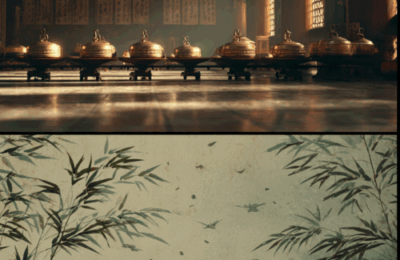
上博楚简呈现了楚国两套截然不同的声音世界:《采风曲目》是一份由王室整理的“宫廷官方歌单”。39 首诗歌被严格按宫商角徵羽分类,每一种调式都有政治用途,是楚国用来观察风俗、监测人心的声音数据库。《逸诗》却像“地下音乐”。因过于私人、质朴、不合礼乐规范,它们被排除在《诗经》之外,却保留了最真实的情感、择友的心意与草木般的自然伦理。当官方歌单用于治理,地下音乐留下灵魂;当制度收编声音,竹简保存野性。两者并存的这一刻,让我们看见楚文明真正的双声轨道。
The Shanghai Museum Chu slips reveal two radically different sound worlds of the ancient state of Chu.
The Cai Feng Qu Mu〈采风曲目〉 functions like a court-curated official playlist.
Its 39 songs are rigorously classified according to the pentatonic modes—gong, shang, jue, zhi, yu—each mode carrying a specific political function. Together they form a sonic database through which the Chu court observed local customs and monitored the sentiments of the people.
The Yi Shi〈逸诗〉, by contrast, reads like underground music.
Too personal, too raw, and too unconstrained by ritual norms, these poems were excluded from the Classic of Poetry. Yet they preserve the most authentic emotions—friendship chosen by the heart, brotherhood expressed through the metaphors of reeds and pine—and a natural ethics as unvarnished as the landscape itself.
When the official playlist serves governance, the underground tracks safeguard the soul.
When institutions absorb and codify sound, the bamboo slips quietly preserve its wildness.
In the coexistence of these two archives, we glimpse the true dual sound-track of Chu civilization.





